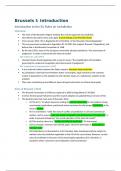Summary
Summary Conflict of Laws LSE LLB Notes
- Institution
- London School Of Economics (LSE)
Conflict of laws notes with a wide enough array of topics to do well in the exam. In my open-book exam, I got a First after only bringing these notes into the exam.
[Show more]



